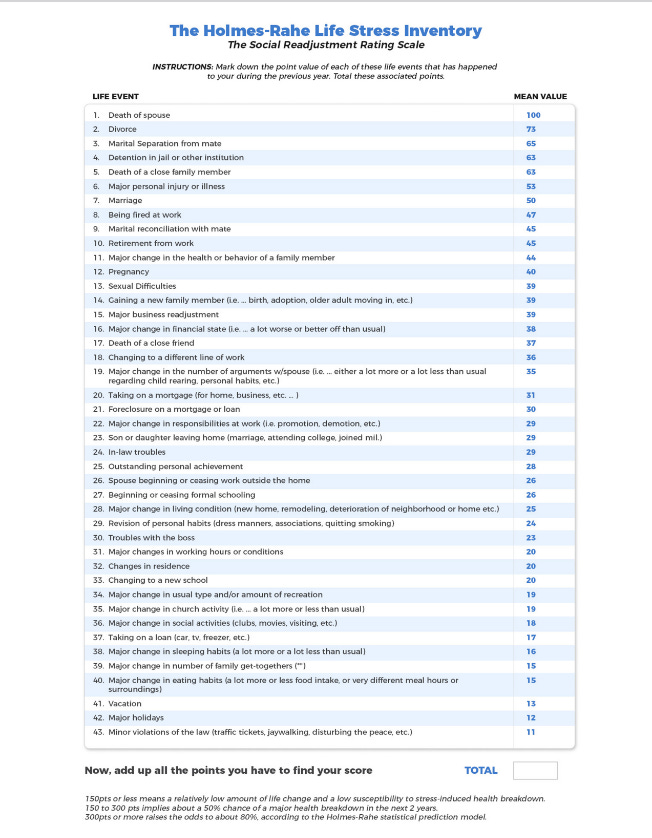How to Handle Stress in Pastoral Ministry
This post is part of a series I’m doing in October on pastoral ministry. If you’re new here, my husband is currently the lead pastor of a church outside Savannah, Georgia. We’ve been in full-time ministry since 2009, and he’s been an ordained pastor for almost 10 years. I am writing out of our experience in hopes that it will encourage those in ministry as well as those who love people in ministry.
Previous posts:
How to Appreciate Your Pastor (and Why I Appreciate Mine)
The Venn Diagram of Relationships for Pastors and Their Families
When I was in college studying psychology, I ran across a tool called the Holmes-Rahe Life Stress Inventory.1 Since then I’ve shared it with dozens of people, and I think it’s especially helpful for those in pastoral ministry to be aware of it because it can help quantify the hard things they’ve gone through and be aware of the impact stress might be having on them.
Here’s how it works: You add up the values of all the things that have happened in the past year. Then the scale attempts to predict your risk of a major health breakdown in the next two years. A score of 151-299 implies about a 50% risk of a major health breakdown in the next two years; a score of 300 or more implies about an 80% risk.
Is Pastoral Ministry Stressful? A one-family case study
Just for fun2, I decided to go back over the last 16 years of our life in pastoral ministry and attempt to figure out my score for each year. I am pretty sure I have forgotten some of the things that happened, so some of these scores are probably lower than I would have given myself at the time. Remember the two milestones: 150 points and 300 points.
From 2010-2012, my average score was 278, with 2012 netting a score over the 300 point mark.
2013 was a lower year—only 110!
From 2014-2020, the average was 246. Both 2015 and 2020 were over 100, with 2020 topping out at my highest score in all 16 years: 321. (For more reasons why, you can read On Losing a Year of My Life, but Not Life Itself.)
In 2021, I had the lowest score in all 16 years: 87.
2022 was just over the 150 point mark, and 2023 went back down below to 136.
Then 2024 happened and I almost hit 300. Now it’s 2025 and the year isn’t over yet, but I’m already over 200 points.
Of course, some of the things that gave me points could happen to anyone. But the way pastoral ministry intersects with one’s personal life means that some events trigger other stressful events, just like I shared in my last post on relationships in pastoral ministry.
I know I’m not alone. We have many dear friends in ministry, and this fall I’ve been to two different conferences where I’ve met men and women for the first time. Among ministry folks, conversation gets to what’s hard very quickly, because most of the hard things affect them personally. We are all people living in the same world as everyone else, and everyone is stressed. The challenges of life in ministry just add more layers.
Why Would Anyone Be in Pastoral Ministry?
The fact of stress in pastoral ministry begs the question—why is anyone doing this? To those who don’t follow Jesus, it probably looks insane. To those who do follow Jesus, it can also look insane. And if I’m being honest, that question is one I have asked Christian more than once in our marriage.
Here’s one of the apostle Paul’s description of pastoral ministry, which probably would not make for a great job posting:
We don’t want you to be unaware, brothers and sisters, of our affliction that took place in Asia. We were completely overwhelmed — beyond our strength — so that we even despaired of life itself. Indeed, we felt that we had received the sentence of death, so that we would not trust in ourselves but in God who raises the dead. He has delivered us from such a terrible death, and he will deliver us. —2 Corinthians 1:8-10 (CSB)
“You’re going to feel like you can’t keep going, and you might even wish you could die. You might even start to believe you are actually dying.” —> SIGN ME UP!
One of the greatest faith challenges for me over the past decade and a half has been struggling through two true things: first, My husband is clearly called to this and would probably shrivel up and die if he wasn’t a pastor, and second, this feels way too hard most of the time. The anguish Paul describes in 2 Corinthians isn’t physical—it’s emotional (“we FELT that we had received the sentence of death”).
My husband’s calling has also made this my calling, not to also be a pastor or to be on staff at the church, but to bear with him the weight of what this calling means. He doesn’t tell me everything, and he doesn’t need to. In fact, he tells me a lot less now than he used to in the first few years of our marriage. I can see it in his voice, in his face, in how he walks. There was a season where when he got home from work, I would brace myself before taking a good look at his countenance. He never took his stress out on me, but I couldn’t help but carry the weight of what the stress was doing to him, and I was already exhausted.
I once sat with a woman whose husband was about to start a new ministry job. I asked how she was feeling about it, and her eyes lit up. “I’m excited to serve alongside him and just jump right in!” I celebrated with her on the outside, even as the Eeyore who lives inside me thought, “Well, don’t get TOO excited.” The good reasons for pastoral ministry—proclaiming the gospel of Jesus to both Christians and nonChristians—means you are signing up to be in relationships, which can sometimes hurt.
How Do I Handle the Stress?
Well, you’re here now, and you believe God has called you to this, and you are praying for the grace to sustain you and that you would continue to experience the joys of pastoral ministry. But the stress keeps coming. I am not an expert, and everyone is in a different context, but here are the things that have kept us going so far.
Strengthen relationships within your church
There have been people who have said pastors and their wives can’t have friends within the church. I think such an absolute statement is unhelpful. These kinds of friendships take time and discernment, and you probably can’t be good friends with everyone at your church, but you can be vulnerable with people without breaking confidentiality. My counselor once told me that when I’m sharing with someone within the church about something that relates to the church, I can always talk about how it’s affecting me. For example: “Christian is bearing a lot of things right now as the pastor, and walking with him is making me feel overwhelmed.” Or: “[A recent event that the person knows about] has been really hard on me because Christian and I have been having a lot of meetings with the people involved. It has overloaded our schedule and made life feel really chaotic.” Even though you can’t share everything, you can still share how you’re doing.
It’s especially great if these relationships can exist outside of church. We have one couple at church who also loves good movies, so every once in a while we go to their house and eat yummy food and watch a movie together. We don’t talk about church. These friendships keep us going.

Develop relationships outside your church
If I had a quarter for every time I heard a pastor or his wife say that they don’t really have friends outside their church, I would have a lot more money than the $8/month I get from writing this Substack. In their defense, this is very hard. It takes a lot of work to develop and maintain relationships with people who you don’t see often. In ministry, the people in your church and your family often suck up most of your time. Here are some of the ways we’ve been able to do this:
Christian has cold called / texted / e-mailed every pastor within a 15-mile radius of our church and asked to get lunch. Some haven’t responded, some he’s only met once, and some are now part of a group text. He gets lunch with the men in this group once a month and they’ve traveled to conferences together. We went with them and their wives to a concert last year.
If your church is part of a denomination, see what kinds of ministries or programs exist to connect churches. If one doesn’t exist, you can probably get contact info so that you can reach out yourself.
Attend a conference and continue to reach out to people you really connected with. I attended Feed My Sheep Pastors’ Wives last month and was overwhelmed at the number of like-minded women I met. Our church is also part of the Harbor Network, and I have made lifelong friends through that partnership.
After somewhat randomly running into another pastor’s wife at a wedding, we decided to start a monthly Zoom where we pray for each other, read books together, and share whatever we are currently struggling with at church. We can do so without having to filter everything we say since it’s a private meeting and we don’t know people at each other’s churches anyway. We pulled in three other women and the five of us have been meeting monthly for almost three years.

Find a hobby
Around the same time, Christian began gardening as a hobby and I began to consider reading as a hobby while also beginning to cross-stitch. For both of us, these hobbies have been a lifeline in extremely stressful seasons. They allow us to do something productive with our hands and minds that don’t have anything to do with church. Ministry life is a like a liquid—it fills all your emotional space if you let it. Having these hobbies helps set up a barrier and provide a means of emotional regulation.
Set healthy boundaries
Years ago, Christian decided Friday would be his day off. On Fridays, he does not check his work e-mail and he does not check texts regularly. Our congregation knows to contact one of our other elders if they need something (unless it is an emergency). He looks forward to Fridays and I do, too, because I know the kids and I can have his full attention (when he’s not gardening). I credit this Friday boundary with us lasting as long as we have in pastoral ministry. I also try to keep Friday free of church stuff, including meeting with people for counseling conversations. Meeting with people to talk about hard things in their lives is, in my opinion, one of the great honors of ministry, but I have to make sure I’m keeping some margin in my week.
Don’t talk about church-related stuff after 10 p.m.
Sometimes this is the only quiet time that we can talk about church-related stuff, because our kids are all in bed or otherwise occupied. But nothing good ever comes of this. We will spin each other into anxiety and despair and then when we finally go to bed at midnight, neither of us can sleep. Church conversation is best over coffee in the morning after a good night’s sleep.
Recognize the unique requirements of ministry life
It took until way too far into our marriage for me to recognize I was trying to live my life with the same weekly rhythms as everyone else. Most people, if they work during the week, experience the weekends as a time of relaxation. I expected to feel the same, and so I was always confused when I woke up Monday morning feeling as though I had been hit by a truck. I finally realized the weekends were always going to be stressful, and so I should not plan for Monday to be the day when I get all the things done. Our Mondays are similar to a lot of people’s in that our kids go to school, but for me personally, I plan very little on Mondays. I usually do a lot of house cleaning, which provides some physical exertion and is completely mindless. Realizing this set me free from a lot of unrealistic expectations and helped me re-organize our week so that I could reduce some of the stress.
Cling to Jesus
This should probably go without saying, but even with doing all these things, sometimes there is nothing left to do but ask Jesus for help to keep going. Some days feel like I’ve got a two-ton burden on my back, and I don’t know if I can take another step.
Therefore, since we also have such a large cloud of witnesses surrounding us, let us lay aside every hindrance and the sin that so easily ensnares us. Let us run with endurance the race that lies before us, keeping our eyes on Jesus, the pioneer and perfecter of our faith. For the joy that lay before him, he endured the cross, despising the shame, and sat down at the right hand of the throne of God.—Hebrews 12:1-2
Stress will happen. We can’t avoid it. And just like the family going on the bear hunt, we often can’t go around it or over it. We have to go through it. It’s hard. It’s a little easier if you learn ways to handle the stress. And it’s always worth it.
This scale was created after a study done on 2,500 sailors. There are some criticisms of the study, which you can read about on its Wikipedia page. Most of the criticism relates to two issues: first, that there is no differentiation between positive and negative experiences; that is, the birth of a child and the death of a spouse are both on the list. (That said, anyone who has added a child to their family knows that it is stressful, even as you are overjoyed at the new addition.) The second criticism is that it is not specific enough; for example, the death of a spouse is given a value of 100 but the way in which you spouse dies could potentially make it even more stressful. While I recognize the limitations of this scale, in my mind, if it were changed, it would only cause any one person’s overall score to increase, if anything. And so I still think it’s helpful.
Reliving the stressful events of the last 16 years was actually NOT THAT FUN






Man, you are speaking truth about ministry and yet, I appreaciate that you have found ways to persevere in the midst of the stress. I imagine if I looked back, I'd be shocked at my stress ratings too...maybe ignorance is bliss there. :) So thankful for your writing and for Jesus being glorified in it. He certainly holds us fast. :)